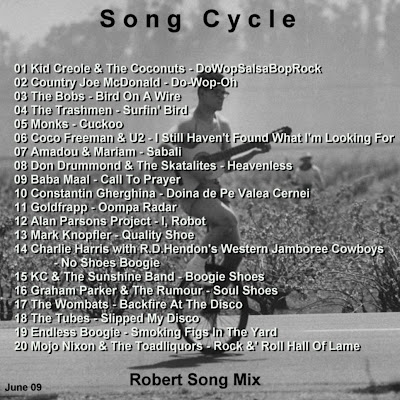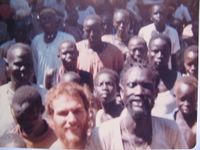Wednesday, November 25, 2009
Thursday, November 05, 2009
Wednesday, September 30, 2009
Monday, September 28, 2009
Thursday, September 24, 2009
Sunday, September 20, 2009
Sunday, September 13, 2009
JA Producers: Duke Reid


Listen.
After serving 10 years as a Jamaican Police Officer, Reid left the force to help his wife Lucille run the family business, The Treasure Isle Grocery and Liquor Store.
He made his way into the music business first as a sound system (outdoor mobile discothèque) owner, promoter and disc jockey. He quickly overtook Tom the Great Sebastian and his sound system as the most popular sound system in Jamaica. Soon he was also sponsor and presenter of a radio show, Treasure Isle Time. A jazz and blues man at heart, Duke chose 'My Mother's Eyes' by Tab Smith as his theme tune. Other favourites of his included Fats Domino, a noticeable influence on the early Duke Reid sound.
Early Reid productions were recorded in studios owned by others, but when the family business moved from Pink Lane, Kingston to Bond Street, Reid set up his own studio above the store. He became proprietor of a number of labels, chiefly Treasure Isle and Dutchess (his spelling). Much of his income derived from licensing agreements with companies in the UK, some of which set up specialist Duke Reid labels.
He dominated the Jamaican music scene of the `60s, specialising in ska and rock-steady, though his love of American jazz, blues and soul was always in evidence. Duke Reid had several things going for him that helped him to rise to prominence. He made a concerted effort to be in the studio as much as possible, something his counterparts didn't do. Duke was known as a perfectionist. He also had a knack for adding symphonic sounds to his recordings and producing very dense arrangements. Furthermore, his records were considerably longer than those being produced by his rivals. His tunes often broke the four-minute barrier while most ska songs were barely longer than two minutes.
Reid initially disliked ska for being too simple and having too much focus on drums rather than on guitar. However, Reid eventually got behind ska. By the `70s, Reid's poor health and the trend towards Rastafarian influenced roots reggae noticeably reduced the number of releases from Treasure Isle. Reid forbade Rasta lyrics from being recorded in his studio and thus Coxsone Dodd was able to dominate the Jamaican recording industry. Reid maintained his high profile largely by recording the `toasting` of DJs U-Roy and Dennis Alcapone.
At around this time, Reid protege Justin Hinds noticed his boss appeared unwell and recommended a doctor. Cancer was diagnosed and Reid decided to sell Treasure Isle to Sonia Pottinger, widow of his friend Lenford `Lennie the King` Pottinger, and already owned High Note Records which was one of the largest record company's on the Island. He died in 1975.
Reid was posthumously awarded the Order of Distinction in the rank of Commander on October 15, 2007.
Thursday, September 10, 2009
We've Been Everywhere
We've Been Everywhere
A Dark Song Mix
A 3 CD set where JohnnyDark and I take a world tour, hopping borders and continents till finally arriving back in our home towns.
Listen
Wednesday, July 22, 2009
Saudades & Soul Shakin'

 Listen.
Listen.Derhay left a comment on our recent MAS(Doowad and Robert Song)mix Stepmama Africa asking why no Cesaria Evora. I contacted him telling him I was big fan of the barefoot diva from Cape Verde and suggested maybe we could do an alt-dj mix starting out with her.
And here is the result. This came together rather quickly but the mix is outstanding.
Wikipedia describes Saudades as a word for a feeling of nostalgic longing for something or someone that one was fond of and which is lost. It often carries a fatalist tone and a repressed knowledge that the object of longing might really never return.
Certainly Cesaria Evora is a master at singing in that style. She can be heard on the second track in a duet with Malian Salif Keita.
But what better way to shake yourself out of a wishful longing then by some soul shakin'. Once this mix gets in the groove there is no stopping it. Seriously Funky.
Tuesday, July 14, 2009
Stepmama Africa


Listen
A follow up to the Mama Africa Mix that Doowad and I did earlier in 2009. Again this covers music from Africa Diaspora.
Friday, July 03, 2009
Wednesday, July 01, 2009
Odisea Ibero-Americana

Listen Disc 1 Disc 2.
Doowad and I, like some latter day Pedro Alvares Cabral or Christopher Columbus have used the Iberian Peninsula as our launching point for our latest globe trotting musical odyssey.
The Spanish and Portuguese endeavours in exploration and colonization have for better or worse left a lasting legacy in the Old and New World including many musical styles that loosely fit under the "Latin American" banner.
Ay Caramba! , how can you refuse a mix with The Most Beautiful Song in the World on it?
Saturday, June 27, 2009
Marley Music

I made this mix up for a runner friend of mine who is into her music. I was out running and listening on my mp3 player as usual when we crossed paths and we ran together for a while. She asked me what I was listening to. Well at that point I was listening to Mali Koura by Issa Bagayogo (which I highly recommend ). Now I thought if I say I am listening to Issa Bagayogo it won't mean much to her, so I replied "I am listening to something from Mali". To which she replied "So you like a bit of reggae do you?".
Well of course I like a bit of reggae but I had to correct her and point out that it was the African land locked country Mali and not the international reggae superstar.
So I decide she needed a mix of "Marley" music to put her staright. Looking at it now I don't know why I didn't put any Issa Bagayogo on here but it certainly is full of quality tracks by some of the big stars both past and present of Mali.
By co-incidence the Malian flag is the very same red gold and green clours so beloved by the reggae Rastas.
Sunday, June 21, 2009
JA Producers: Clement S. (Coxsone) Dodd

In Jamaica, record producers have always had a lot of control over the artists they record. For better or worse this is the way the business was done. Luckily some of these producers also had a wonderful feel for the music and popular trends. The King of the producers throughout the 60's and 70's was Clement S. Dodd or Coxsone or Sir Coxsone as he was sometimes known. His Studio One Label's catalogue is unrivalled. The tracks on this collection come from 1959 to the mid 80s.
A true legend of Jamaican Music.
This obiturary from The Guardian says it all.
The Jamaican record producer Clement "Sir Coxsone" Dodd, who has died of a heart attack aged 72, nurtured the career of nearly every internationally renowned reggae artist. He was one of the first to record local talent, and an integral force in the development of ska. Having been involved in the development of reggae for more than 50 years, his contribution to the evolution of the island's music, from his Studio One recording facility, is simply enormous. It was at Studio One that he cut the first recordings by Bob Marley and the Wailers. Dodd was born in Kingston, spent some formative years in the parish of Saint Thomas, and returned to the capital to learn cabinet making and train as an automobile mechanic. Dodd's father was a contractor-cum-mason who helped build the Carib Theatre, a landmark building in the Kingston Cross Roads business district. In the early 1950s, Dodd's mother ran the Nanny's Corner restaurant at the downtown junction of Lawes Street and Ladd Lane. There customers were entertained by the sound, if not the presence, of Billy Eckstein, Sarah Vaughan, Lionel Hampton and Louis Jordan wafted out of the family Morphy Richards radio.
In the early 1950s, Dodd worked as a farm labourer in the United States. Having seen the money being made at outdoor block parties he started thinking about an entry into the music business.
From the late 1940s, the Jamaican music scene was based around the sound systems, huge sets of portable equipment that played rhythm and blues at open-air dance events. In the early 1950s the leading sound was Duke Reid The Trojan, established by former policeman Arthur Reid, a friend of Dodd's parents. Dodd did guest spots, spinning his records on Reid's set, but then became Reid's biggest competitor with the Sir Coxsone's Downbeat sound system. It took its name from a noted Yorkshire cricketer whose batting skills Dodd was said to emulate.
Dodd had a superior selection of R&B and rare jazz discs; he also had toaster Count Machuki, a wisecracking DJ. Several other later famous figures worked for Dodd in this early phase. These included Prince Buster, a former boxer who staved off attacks from rival sound systems before striking out on his own in 1957, and Lee "Scratch" Perry, who began working for Dodd as a vocalist, talent scout and general dogsbody in 1961.
In 1956, Dodd began recording artists such as Bunny and Skully at Federal studio, usually with R&B echoes. An early hit, Theophilus Beckford's Easy Snappin, had a different beat, pointing the way to the ska that Dodd would champion by the end of the decade. By the early 1960s, he was ruling Jamaica with ska hits by Toots and the Maytals, the Gaylads and the Skatalites, Jamaica's premier ska group.
In October 1963, on the site of a former nightclub, The End, Dodd opened the Jamaica Recording and Publishing Studio - always called Studio One - close to the Carib Theatre at 13 Brentford Road. He signed Bob Marley and the Wailers, and gave them immeasurable guidance, selecting Marley as leader and scoring several number ones with them. He acted as something of a surrogate father to Marley during this period, even giving him a place to live on the premises.
When rock-steady briefly supplanted ska in 1966, Dodd found Duke Reid overshadowing him, but when the new reggae style emerged in 1968, Coxsone was back on top with enthralling recordings by the Heptones, the Abyssinians, Bob Andy and Marcia Griffiths. The organist Jackie Mittoo, who arranged much of this material, also scored instrumental hits of his own.
In the early 1970s, Dodd advanced Dennis Brown's career and made forays into dub. Although recuts of his rhythms recorded at his rivals, Channel One, subsequently found greater favour, he beat them at their own game with a Studio One renaissance in 1979, voicing new material with proto-dance hall singers such as Sugar Minott, Johnny Osbourne and Freddy McGregor, plus DJs Lone Ranger and Michigan and Smiley.
Then armed bandits attacked the Brentford Road headquarters. Dodd transferred Studio One to Brooklyn, New York, where he recorded during the 1980s and early 1990s. The music included dancehall works, with Frankie Paul and JD Smoothe sometimes voicing on new mixes of old rhythms. Reissues by Boston's Heartbeat records also kept his vintage material in focus.
In 1991, he received the Order of Distinction, Jamaica's third highest honour. Following his mother's death, Dodd moved back to Kingston in 1998 and reopened the Brentford Road for new recordings with veterans and young talent alike, while reissues and a documentary DVD released by London's Soul Jazz records brought Studio One's popularity to an all-time high. Last week, the Jamaican government renamed Brentford Road Studio One Boulevard.
Throughout it all, Dodd remained an avid music lover and an astute businessman. For the past few years, he had been plagued by arthritis. His wife Norma and several children survive him.
· Clement Seymour Dodd, record producer and entrepreneur, born January 26 1932; died May 4 2004
Sunday, June 14, 2009
Return To Aztlan
Saturday, June 06, 2009
Song Cycle
Thursday, June 04, 2009
Saturday, May 30, 2009
Orbitone's Soca Magic
Sunday, May 24, 2009
Saturday, May 23, 2009
DBC and I&I

 In the time I lived in London from 1979 to 1983, my knowledge and appreciation of reggae music was very much aided by the pirate radio station DBC The Dread Broadcasting Corporation. This mix blends together DBC promo jingles with some choice reggae cuts taken from 12" singles I purchased in that period. Like any good 12" it contains some songs , some toasting and some dub.
In the time I lived in London from 1979 to 1983, my knowledge and appreciation of reggae music was very much aided by the pirate radio station DBC The Dread Broadcasting Corporation. This mix blends together DBC promo jingles with some choice reggae cuts taken from 12" singles I purchased in that period. Like any good 12" it contains some songs , some toasting and some dub. Tune in if you rankin.
Asia Asha to Zulal
Saturday, May 09, 2009
Thursday, May 07, 2009
Monday, May 04, 2009
May Day Work Songs


It is Monday 4th May and here in the State of Queensland, it is a public holiday to celebrate Labor Day. Rather than being celebrated on May Day (1st of May) it is scheduled for the first Monday after that, and so giving us workers a treasured long week-end. So in honour of all the workers of the world here is a collection of Work Songs. The cover art is taken from the 1967 Labor Day Parade in Brisbane. Given that Queensland is considered to be one of the more conservative states of Australia, it is rather amusing that we are about the only ones outside the Socialist countries who still celebrate May Day in such a fashion.
A short History of May Day.
A short History of May Day.
The happy idea of using a proletarian holiday celebration as a means to attain the eight-hour day was first born in Australia. The workers there decided in 1856 to organize a day of complete stoppage together with meetings and entertainment as a demonstration in favor of the eight-hour day. The day of this celebration was to be April 21. At first, the Australian workers intended this only for the year 1856. But this first celebration had such a strong effect on the proletarian masses of Australia, enlivening them and leading to new agitation, that it was decided to repeat the celebration every year.
In fact, what could give the workers greater courage and faith in their own strength than a mass work stoppage which they had decided themselves? What could give more courage to the eternal slaves of the factories and the workshops than the mustering of their own troops? Thus, the idea of a proletarian celebration was quickly accepted and, from Australia, began to spread to other countries until finally it had conquered the whole proletarian world.
The first to follow the example of the Australian workers were the Americans. In 1886 they decided that May 1 should be the day of universal work stoppage. On this day 200,000 of them left their work and demanded the eight-hour day. Later, police and legal harassment prevented the workers for many years from repeating this [size] demonstration. However in 1888 they renewed their decision and decided that the next celebration would be May 1, 1890.
In the meanwhile, the workers' movement in Europe had grown strong and animated. The most powerful expression of this movement occurred at the International Workers' Congress in 1889. At this Congress, attended by four hundred delegates, it was decided that the eight-hour day must be the first demand. Whereupon the delegate of the French unions, the worker Lavigne from Bordeaux, moved that this demand be expressed in all countries through a universal work stoppage. The delegate of the American workers called attention to the decision of his comrades to strike on May 1, 1890, and the Congress decided on this date for the universal proletarian celebration.
In this case, as thirty years before in Australia, the workers really thought only of a one-time demonstration. The Congress decided that the workers of all lands would demonstrate together for the eight-hour day on May 1, 1890. No one spoke of a repetition of the holiday for the next years. Naturally no one could predict the lightninglike way in which this idea would succeed and how quickly it would be adopted by the working classes. However, it was enough to celebrate the May Day simply one time in order that everyone understand and feel that May Day must be a yearly and continuing institution [. . .].
The first of May demanded the introduction of the eight-hour day. But even after this goal was reached, May Day was not given up. As long as the struggle of the workers against the bourgeoisie and the ruling class continues, as long as all demands are not met, May Day will be the yearly expression of these demands. And, when better days dawn, when the working class of the world has won its deliverance then too humanity will probably celebrate May Day in honor of the bitter struggles and the many sufferings of the past.
Subscribe to:
Posts (Atom)

















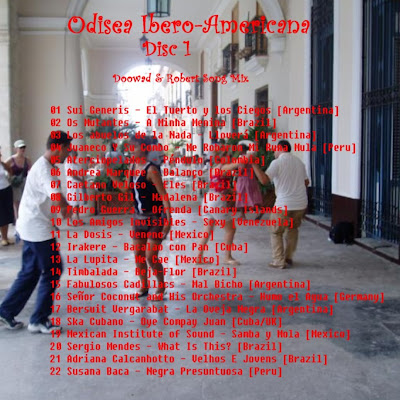


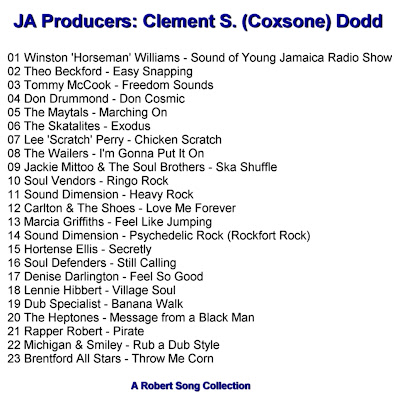

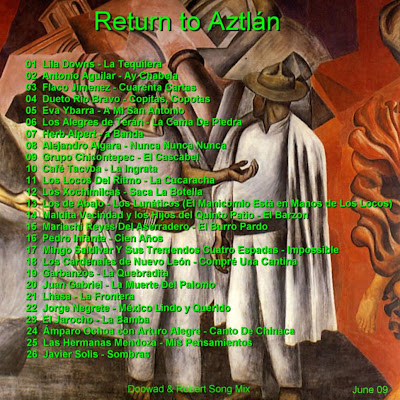 A rousing journey through Mexican music styles and eras expertly guided by local expert Senor Doowad.
A rousing journey through Mexican music styles and eras expertly guided by local expert Senor Doowad.
